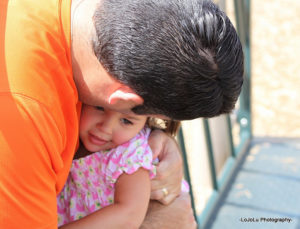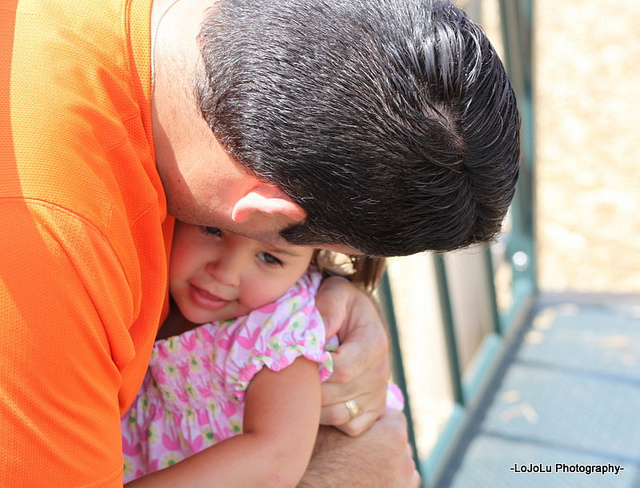 It has been the Year of the Woman. We’re kicking butt in the primaries, exercising our power through the #MeToo movement and promising that come November we will orchestrate a monumental shift in the direction of our government.
It has been the Year of the Woman. We’re kicking butt in the primaries, exercising our power through the #MeToo movement and promising that come November we will orchestrate a monumental shift in the direction of our government.
And with all of this, I believe it’s important that we don’t lose sight of the needs of everyone, including our righteous brothers who need our support.
This Sunday is Father’s Day, and while the journey to parenthood for a father is often vastly different for the male gender, it’s a journey nonetheless. I remember when my husband and I brought our first daughter home. None of us were sleeping. There was a tiny giant in the house with a loud voice who had the audacity not to come with an instruction booklet.
At the time we were blessed that my husband’s company offered two weeks of paternal leave. Add that to my 12 weeks of maternity leave I had to use up my vacation to get (don’t get me started), and we at least had the first three months covered before we had to hand our daughter over to a caregiver.
I remember my husband feeling a little uncomfortable taking the leave. His firm was the champion of work-life balance in language only, not in practice. At the same time, he knew he was needed at home, and we also knew that those precious first weeks, while hard, are also irreplaceable and special.
Our family was in the very tiny – and very lucky – minority. Roughly 88% of people working in the US don’t have access to any form of paid family leave through their jobs. Some companies offer temporary disability or some other form of leave to cover new mothers recovering from childbirth, but most don’t offer any form of leave to new dads. This matters for several reasons:
- Dads want to be parents, too. A 2013 survey showed that working dads were twice as likely as working moms to report that they don’t spend enough time with their kids. (link:
- Fathers who take time off for the birth of a child are more likely to be involved in child care and other aspects of a child’s life in later years. Kids whose dads are more involved in the early years show improved language skills, higher cognitive test scores and stronger social skills than kids whose dads are less involved.
It’s hard to believe in the 21st century that we don’t have paid leave in a country that prides itself on being so advanced. We are the ONLY industrialized nation IN THE WORLD that doesn’t provide some form of paid leave after having a child. I have friends in Canada who take leave for having a child and are then able to return to work at their same high-level position. My German friend is taking a full year off and will return to her VP of HR job at a large corporation. These companies in other countries understand that over the long term, keeping employees and supporting their efforts to have a family pays off in the long run. Replacing an employee permanently, rather than providing leave, can cost as much as five times the employee’s yearly wages – not to mention losses in productivity and impacts on morale.
This Father’s Day, we are partnering with the North Carolina Justice Center and the NC Families Care Coalition to celebrate #Dadvocates and also call on our lawmakers to pass some crucial legislation to support working dads when their families need them most. I consider myself a generally well-informed individual, but even I didn’t know these were on the table.
Did you know about the Caregiver Relief Act (HB 269/SB 337)? It’s a bill in the North Carolina State Assembly that would expand the types of family relationships covered to include care of siblings, grandparents, grandchildren, step parents and in-laws. That’s right: as of now, if someone in your family who is not a child, spouse or parent gets seriously sick and you need to take time off to care for them, your employer can deny the request, and your job is not protected. NC is also home to more than 100,000 grandparents who are primary caregivers for their grandchildren, and many of them are still in the workforce. They need access to FMLA when serious medical situations arise, so that they can be there for their grandkids and not lose their jobs.
At the federal level, there is the Family and Medical Insurance Leave (FAMILY) Act . It would provide up to 12 weeks of leave with partial income (up to 2/3 of regular monthly wages) when employees take time off for family and medical situations including pregnancy/adoption/foster placement, or a serious health condition that impacts a child, parent, spouse, domestic partner. The leave would be available to both moms and dads, which is critical because maternity leave-only policies steer companies away from hiring or promoting qualified women who might have children during their time with the company, deepening the gender pay gap and contributing to overall gender inequality.
Working dads need access to these policies just like the rest of us. If we’re going to create the world we want to live in, where gender inequality is a thing of the past and working people are supported to make the best choices for ourselves and our families, we need policies that allow men to be just as involved as women in family caregiving.

[…] this is from “Do You Know a #Dadvocate?” in which Stephanie Carson of Women Advance celebrates her own husband’s parenting and the […]